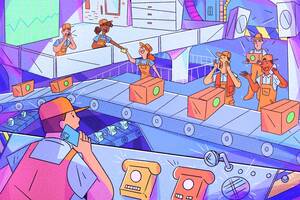Organizations Dec 9, 2013
Rich and Unhappy—and Fine with Unethical Behavior?
Ethics, income, and feelings of well-being influence each other in unpredictable ways

Keith Murnighan does not mince words. “I don’t know about you, but I prefer more income to less,” he says. “But does it make me happier? Actually, it bums me out because I’m scared of losing it.”
Murnighan, a psychologist by training and a professor of management and organizations at the Kellogg School, is describing his personal experience of one of the most famous conclusions (the Easterlin paradox) in social science: that above a certain threshold, money can no longer buy happiness—and in fact seems to actively erode it. But Murnighan also wondered how ethics intersected with the interplay between income and happiness. “I teach our executive MBA program on ethics and leadership, and we often talk about how in certain countries, corruption, bribery, and other unethical behavior is seen as a given—‘the way business gets done,’” he says. “But my feeling is that even if it’s pervasive, people really do understand that bribery is unethical—and that has all sorts of negative social consequences.”
With his coauthor Long Wang of the City University of Hong Kong, Murnighan decided to investigate how money, emotion, and ethics relate to each other among individuals as well as entire countries. “Part of what we’ve studied in the past is greed,” he says. “Plato and Aristotle would say that greed is short sighted, and our data support that very nicely 2000 years later. So if we take that seriously, the issue becomes: As your income increases, do you become less tolerant of unethical behavior, or more?”
High Earners, High Impacts
To study this question empirically, Murnighan and Wang sampled data from the 2005–2006 World Values Survey, which asked individuals from 27 countries to report their income, rate their own happiness on a scale of one to ten, and also rate how much they approved of certain commonplace unethical behaviors (such as cheating on one’s taxes or riding public transport without paying a fare). “Even regular people are tempted to say, ‘Yeah, that’s okay,’” Murnighan says.
“The strongest individual result is a combination of high income and life satisfaction—these people are the most disapproving of unethical behavior.” — Keith Murnighan
He and Wang also sampled survey data on corruption in 55 countries from the World Bank’s Global Competitiveness Report, and happiness scores from the same countries in the World Database of Happiness. “These other databases allowed us to put these questions together in a novel way and see what came out,” Murnighan says. “It’s not characteristic of my previous research, which has almost all been done in a laboratory. But the beautiful thing about the age we live in is that we can use this kind of data to dig into the details of ethical dilemmas on a broad scale. We certainly didn’t expect to find what we did.”
Those findings, which Murnighan and Wang describe as “provocative,” showed a relationship between money, happiness, and ethics that “tells whom you might want be careful of in terms of trustworthiness,” Murnighan says. Of the 27,672 professionals whose survey data the researchers analyzed, the most likely to approve of unethical behavior were those respondents who had a low level of happiness but a high level of income. At the same time, Murnighan says, “the strongest individual result is a combination of high income and life satisfaction—these people are the most disapproving of unethical behavior.” Zooming out to the country level, he and Wang also found that “the more corruption there is, the less happy people are.”
Rich, Happy, and Ethical
To Murnighan, these findings give a “powerful” glimpse into the economic factors that influence happiness at the micro and macro levels. “Life satisfaction and happiness are desirable outcomes for individuals, and for societies as a whole,” he says. “We don’t know what causes what—does being rich and happy make you more ethical, or does being more ethical make you richer and happier? But we can show that people who are exuberant and upbeat about life, and happen to have high income, are likely to be more trustworthy.”
As for the other strong correlation between high income, low life satisfaction, and a tolerance for unethical behavior, Murnighan speculates that “an unhappy rich person might feel bad because of their own unethical behavior, but it might be that very behavior that got them rich in the first place.”
Although their findings do not illuminate the causes or effects between money, happiness, and ethics, Murnighan suspects that “the income probably comes first”—in other words, that having a comfortable amount of money might allow enough psychological “room” to ethically consider the needs and perspectives of other people, which may then lead to feelings of well-being. In contrast, it is not surprising that people who have accumulated considerable wealth unethically would have a high tolerance for unethical behavior. But as Plato and Aristotle have suggested, positive feelings of well-being may not be a part of that equation. “That’s a hypothesis I wouldn’t mind testing,” he says.
He also points to the broader results on corruption and happiness as a clear magnet for further research and policy intervention. “It gives us another argument to fight corruption,” he asserts. “Obviously we want to fight it because it disadvantages people. But if you can make a happier, more attractive society in general with less corruption, that’s all the more reason.”
Wang, Long, and Murnighan, J. Keith. “Money, Emotions and Ethics Across Individuals and Countries.” Forthcoming. Journal of Business Ethics.


